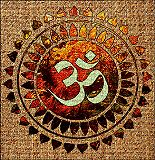|

Hindu
Gods
"There can
really be as many Hindu Gods as there are devotees to suit the moods, feelings, emotions & social background of the devotees." Sri RamaKrishna
The Hindu Pantheon of Gods is vast. But in fact
Hindus are a monotheistic religion worshipping one God. Hindus believe that there is only one ultimate reality; Brahman.
Brahman is a supreme spirit that permeates everything.
Brahman
is entirely impersonal, and entirely impossible to describe.
Everything in the universe is part of Brahman, but Brahman
is more than the sum of everything in the universe.
The Hindu gods Shiva, Parvati, Krishna, Vishnu, Lakshmi, and Ganesh serve as a way in which devotees can see, touch and feel this unknowable God,
Brahman. They give the layperson a tangible, knowable aspect of the Supreme Being. Each of the Hindu Gods represents
one aspect of Brahman. Shiva takes on the destructive aspect of Brahman. Vishnu preserves the working order of
the universe. Each Hindu God is one tiny aspect of the Supreme Being.
Below are listed many of the most well known Hindu gods
within the Hindu pantheon.
Here we present extensive resources for understanding the concept of God in Hindu dharma.
The Hindu Trinity, forms of Gods and Goddesses, the Avatars of Lord Vishnu, the Devatas, Planet and Animal Deities are all presented with their image representation.
If you have ever wondered, if Hindus worship one God or many Gods, why do Hindus worship images and icons, why
does the God in Hindu dharma have multiple names and multiple forms of God, then this is the where, we hope, you will find
answers. Dr. David Frawley has answered many of these commonly asked questions quite succinctly. For example,
Why
Do Hindus Worship Many Gods?
Human beings through history have formulated many different names and forms for the
Divine or Eternal. Just as we have many names and forms for other things, whether it is foods, or types of art, so too, in
religion a similar great diversity has been created.
The Western world has prided itself in monotheism, the idea that
there is only One God as the highest truth. Western religions have said that only the names and forms which refer to this
One God are valid but those which appear to worship another God, or a multiplicity of divinities, must be false. They have
restricted the names and forms they use in religious worship, and insist that only one set is true and correct and others
are wrong or unholy.
As a universal formulation Hinduism accepts all formulations of Truth. According to the universal
view there is only One Reality, but it cannot be limit ed to a particular name or form. Though Truth is One it is also Universal,
not an exclusive formulation. It is an inclusive, not an exclusive Oneness - a spiritual reality of Being - Consciousness
- Bliss, which could be called God but which transcends all names. The different Gods and Goddesses of Hinduism represent
various functions of this One Supreme Divinity, and are not separate Gods.
Having many names for something is not
necessarily a sign of ignorance of its real nature. On the contrary, it may indicate an intimate knowledge of it. For example,
Eskimos have forty-eight different names for snow in their language because they know snow intimately in its different variations,
not because they are ignorant of the fact that all snow is only one. The many different deities of Hinduism reflect such an
intimate realization of the Divine on various levels.
Or, Why Does Hinduism Portray God as a Woman?
Hinduism
contains many feminine forms of the Divine like Kali, Durga, Lakshmi and Sarasvati. These represent different feminine qualities
and functions of the Divine which contains both male and female energies. For example, Kali portrays the destructive energy,
Lakshmi the nourishing, and Sarasvati the creative, while Durga is the Divine Mother in her protective role. Hinduism also
has many dual male-female forms like Radha-Krishna, Sita-Rama, Uma-Mahesh, and Lakshmi -Narayan in which the female form is
usually addressed first. The different masculine forms of the Divine in Hinduism have their feminine counterparts.
As
Sanatana Dharma or a universal tradition Hinduism recognizes that the Divine contains both masculine and feminine attributes.
Without giving proper honor to the feminine qualities a religion must be incomplete and one-sided, which must result in its
teachings having negative consequences. Without recognizing the feminine aspect of Divinity one cannot claim to know God.
To recognize the feminine is necessary to restore wholeness, completeness and universality
|
|
Concept of Hindu Darma
Hinduism
is supposed to be 'apauruseya', i.e., of impersonal origin & so also are the Gods of Hinduism. They are eternal &
though the deities appear to be different & independent, they are really facets of the same Brahman, the Supreme God.
As Sri Ramakrishna says, there can be as many
spiritual paths as there are spiritual aspirants & similarly there can really be as many Gods as there are devotees to
suit the moods, feelings, emotions & social background of the devotees.
The Hindu scriptures were eloquent while describing the qualities of God. He is all-knowing
& all powerful. He is the very personification of justice, love & beauty. He is ever ready to shower His grace, mercy
& blessings on His creation.
From the Rig Veda, we come to know
of the vedic gods eight Vasus, eleven Rudras, twelve Adityas, Indra & Prajapathi, being the Gods of earth, the heavens
& the space. The main Hindu Gods as we accept today can be broadly classified as Saiva Gods (Siva, His consort, His sons,
His other forms), Vaishnava Gods (Vishnu, His consort, His various avatharams)& Sakthi or Saktha (Forms of Goddess Sakthi).
|

